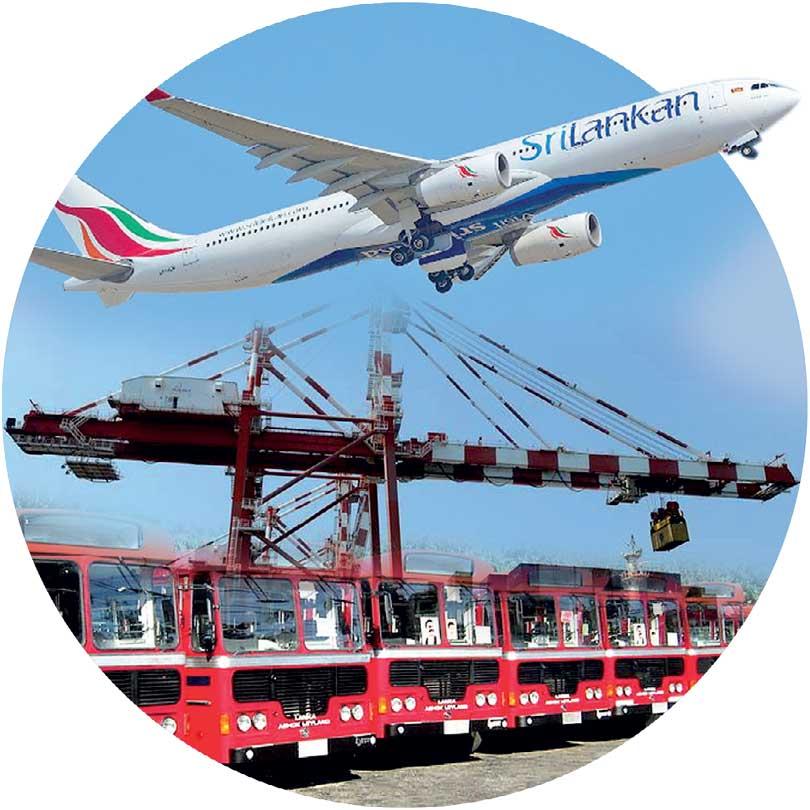Reply To:
Name - Reply Comment
Last Updated : 2024-04-25 22:46:00

 It was welcome news when the new President Gotabaya Rajapaksa said recently that only qualified and experienced professionals will be appointed to head Sri Lanka’s statutory bodies and State-Owned Enterprises (SOEs). A few days later, he appointed a six-member selection board to screen the persons nominated by ministers to head SOEs under them.
It was welcome news when the new President Gotabaya Rajapaksa said recently that only qualified and experienced professionals will be appointed to head Sri Lanka’s statutory bodies and State-Owned Enterprises (SOEs). A few days later, he appointed a six-member selection board to screen the persons nominated by ministers to head SOEs under them.
One of my vociferous friends asked me, “Now, who is going to screen these ‘screeners’ whether they are suitable or not for the Board?” I explained to him that there is no clear reference about it, but quite possibly, they would be answerable to the President himself. However, it’s a good move. Yet, as they used to say, ‘the proof of the pudding is in the eating’, we have to wait for a while and see what comes out of the new selection criterion before we make our final judgement.
Staggering loss
The subject of SOEs is an oft-spoken issue in Sri Lanka for the many past decades. In fact, it is a mysterious subject. To start with, no one seems to know precisely how many business enterprises the Government owns. According to the Mid-Year Fiscal Position Report 2019 issued by the Minister of Finance there are 422 SOEs. Nevertheless, according to a credible research done by a body of experts, there might be around 525 to 530 SOEs in Sri Lanka.
What is already published and known is that in 2018 the top 55 SOEs made a staggering loss of Rs.27.40 billion. What happened to the rest of the SOEs is anybody’s guess. It is also anybody’s guess why none of the Governments in the past did not venture deep into this “mystery” and take appropriate action to rectify the situation.
To be fair, past governments on and off took some decisions. Naturally, they took the easy way out. Privatisation! The catch-word. They believed privatisation was the only viable option for struggling SOEs and sold some enterprises at ridiculously low prices to their kin and friends.
Privatization is not the best way to fix struggling SOEs. Any sensible government would have first explored why these businesses have been encountering loss. For example, three years ago, the Myanmar Union Parliament appointed a commission to investigate state-run enterprises which are running at a loss and ones which were under-performing. A thorough understanding of the shortcomings and the recommendations of the Commission helped the government to evaluate the type of reforms needed to improve their financial standing.
Necessary tool
Globally, the importance of SOEs has steadily increased over the past few decades and are now found in a wide spectrum of industries, such as the natural resources, aerospace, defence, automobile manufacturing, chemicals, transportation, construction and banking. For instance, national oil companies own and control most of the world’s energy supply and 73% of the world’s oil reserves, and 61% of production is State-owned.
SOEs are also important in the domestic economies of many countries, given that they are often some of the largest employers. For example, Sweden’s 2017 Report on State-Owned Enterprises indicated that Sweden has 48 SOEs, which employ 137,000 people. The situation is similar in China, Sweden, Norway, South Africa,France, Brazil, Mexico, India, South Korea, and Russia.
Swedish experience
The policies adopted by Sweden, China, Spain, Finland, and Norway may be examined as examples of good practice. It is, however, acknowledged that there are many other countries where SOEs and State ownership play an important role in the economy. However, ample data is available regarding the five countries listed above.
If we take Sweden as an example, it’s State Ownership Policy has business sustainability at its core and it expressly states that - SOEs should take a long-term approach, be sustainable, efficient and profitable while being given the capacity to develop further. To promote long-term value growth, the sustainable business of all SEOs is integrated into corporate governance. They should thus serve as role models in the area of sustainable business and, therefore, perform in a manner that generates public confidence.
SOEs in Sweden work towards achieving a healthy work environment, respect for human rights, decent working conditions, environmental sustainability, and high standards of business ethics (particularly through the prevention of corruption), as well as responsible conduct with respect to the payment of taxes. The Policy forms an inherent part of the legal framework for the regulation of SOEs and it is mandatory for all companies that are fully or majority owned by the State to comply with it.
In Sweden, the ultimate responsibility for the integration of sustainable business practices falls onto the boards of directors of SOEs. They are accountable and answerable. With regard to implementation, all SOEs have mandatory reporting obligations and the board of directors must ensure that sustainability reporting is done in a comprehensive and transparent manner. Disclosure must be made on the company website and the reports must include, among others, materiality analyses, appropriate sustainability disclosures, and clear information about stakeholder engagement. These are lessons Sri Lanka needs to learn.
Success stories
Some SOEs in emerging markets are closing the gap with their private-sector competitors. Let us take Petronas, an SOE in Malaysia, for example. It all began in 1974 as a medium-sized domestic-based national oil company. Today it is transformed into a fully integrated oil and gas multinational corporation with a value of US$ 90 billion.
From the first year itself they introduced an operational-excellence campaign focusing on improved technical capabilities and a more effective working culture. After five years, the initiative delivered upward of $1 billion in savings and new revenues. What’s more, the company’s operational effectiveness, judged by resource utilization, quality, and performance, is now in the industry’s top quartile. Fortune ranks this SOE as the 158th largest company in the world in 2019.
The SOE drew from well-known best practices in the private sector; they also concentrated on three areas of specific importance: (1) clarifying objectives and securing an explicit mandate, (2) focusing scarce resources on areas with the highest financial impact, and (3) redefining the talent proposition. CEO has tremendous authority - he can implement any move without approval but was accountable for his decisions.
What needs to be done
The recent COPE Committee reported a number of serious concerns of SOEs, which require immediate action. The concerns include (1) lack of transparency and accountability, (2) lack of professional management of public enterprises, (3) financial indiscipline, irregularities, manipulations and malpractices, (4) ineffective progress review and performance monitoring, (5) ineffective internal controls, risk management practices and audit and inadequate disclosures in financial reporting.
The report said that these losses continue to have high negative impact on our fiscal costs. Over the years, most of these establishments have reported significant persistent operating losses.
In this writer’s opinion, if we are to revive the flagging SOEs, we need to confront four key challenges.
(1) Clear clarification of the roles and responsibilities of the Government regarding the SOEs. This goal requires a balance, between the Government’s active ownership responsibilities (like appointing boards and providing control and oversight), and the need to maintain a “level-playing field” for market competition. It is not going to be an easy task unless two important conditions are met: (a) clear legal and regulatory framework, including corporate rules and codes, and (b) a strong and independent coordinating body for oversight and control.
(2) Appointment of a team of qualified and experienced persons to SOE boards. Already the President has appointed a screening committee. All board appointments should be based on merit and not any other criteria. This directs to the need for a unified minimum standard for SOE boards. It is advisable to take it off from the purview of the Minister concerned and make it an open affair where any professional could apply. Board members must be allowed to take independent decisions within the parameters of Government policies. Their performance must be judged on the service quality and profit earned.
(3) An organizational culture of efficiency, integrity, competitiveness and innovation must be instilled in all SOEs. To do this, higher management should apply stringent internal controls and risk management systems. More broadly, this means ensuring, that in every aspect transparency, accountability, and ethics are respected.
(4) In order for SOEs to implement best practices specified in (1), (2) and (3), formal Government agreement should be available. Without that, all efforts to revive and maintain the reforms are likely to fail.
(5) It’s time to establish a State Enterprises Commission. Their assignment is to (a) regularly study in depth the operations of statutory bodies and SOEs, review their objectives, initiate thorough management audit and determine the suitability of enterprise management of all the SOEs. (b) promote efficient and profitable operation of the SOEs, utilising the tools of corporate planning, performance contracting, monitoring and evaluation.
As a final note, let me add that our ailing SOEs are not yet dead. They are critically sick but not beyond redemption. What is needed is an extraordinary political commitment from the highest echelon because SOEs are a crucial clue of the puzzle in achieving economic recovery and promoting sustained economic development.

Add comment
Comments will be edited (grammar, spelling and slang) and authorized at the discretion of Daily Mirror online. The website also has the right not to publish selected comments.
Reply To:
Name - Reply Comment
US authorities are currently reviewing the manifest of every cargo aboard MV
On March 26, a couple arriving from Thailand was arrested with 88 live animal
According to villagers from Naula-Moragolla out of 105 families 80 can afford
Is the situation in Sri Lanka so grim that locals harbour hope that they coul